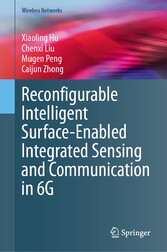Suchen und Finden
Service

Reconfigurable Intelligent Surface-Enabled Integrated Sensing and Communication in 6G
Xiaoling Hu, Chenxi Liu, Mugen Peng, Caijun Zhong
Verlag Springer-Verlag, 2024
ISBN 9789819982998 , 177 Seiten
Format PDF
Kopierschutz Wasserzeichen
Geräte
Mehr zum Inhalt

Reconfigurable Intelligent Surface-Enabled Integrated Sensing and Communication in 6G
As the main trend and key enabling technology for next-generation wireless networks (i.e., 6G), integrated sensing and communication (ISAC) can effectively improve spectrum efficiency, hardware efficiency, and information processing efficiency. However, it faces several deficiencies, including limited coverage due to high-frequency signals and limited communication-sensing performance due to uncontrollable wireless environments. Reconfigurable intelligent surface (RIS) provides novel dimensions to address these deficiencies by intelligently manipulating the wireless propagation environment in an energy- and hardware-efficient manner. RIS-enabled ISAC is expected to comprehensively promote the multi-dimensional performance of 6G, such as communication capacity, sensing accuracy, and coverage. Nevertheless, to fully realize its potential, one needs to figure out the impacts of RIS on joint communication and sensing performance and tackle new technical challenges in beamforming design and signal processing. The goal of this book, therefore, is to deliver a thorough understanding of RIS-enabled ISAC from three perspectives: performance analysis, beamforming design, and signal processing. Specifically, the authors provide a brief introduction to RIS-enabled ISAC, including basic concepts, motivations, potential application scenarios, and an overview of the state-of-the-art research on RIS-enabled ISAC. The theoretical performance analytical frameworks of RIS-enabled ISAC and their corresponding results are also discussed. Based on this, several critical issues are identified and elaborated on, including signal processing technologies such as angle and Delay-Doppler information acquisition, and air interface technologies such as beamforming designs. Finally, the book concludes with future trends and open issues for further research.
The book would be beneficial for researchers, graduate students, and industry professionals who wish to gain a comprehensive understanding of the latest developments and challenges in RIS-enabled ISAC. By providing insights into the potential of RIS-enabled ISAC and the technical challenges that need to be addressed, the book can aid in the development of practical solutions for next-generation wireless networks and contribute to the advancement of the field of wireless communications.
Dr. Xiaoling Hu is currently an associate professor with Beijing University of Posts and Telecommunications. Her research interests include reconfigurable intelligent surface (RIS), integrated sensing and communication (ISAC), wireless sensing, signal processing, massive MIMO and mmWave. She has authored/co-authored more than 20 IEEE journal/conference articles. She was the recipient of the Best Paper Awards at the IEEE ICC 2019, IEEE GLOBECOM 2020, and IEEE ICC 2022. She received her PhD Degree in information and communication engineering from Zhejiang University.
Dr. Chenxi Liu is currently an associate professor with Beijing University of Posts and Telecommunications. His research interests include wireless security, ultra-reliable and low-latency communications, integrated sensing and communications, Internet-of-Things, and network intelligence. He has authored/co-authored more than 30 journal/conference articles. He serves as an Editor for the IEEE WIRELESS COMMUNICATIONS LETTERS, and has been awarded as the Exemplary Reviewer of IEEE COMMUNICATIONS LETTERS in both 2017 and 2018. He served as the symposium co-chair for IEEE ICCC 2020. He received his PhD Degree in Electrical Engineering and Telecommunications from University of New South Wales.
Dr. Mugen Peng has been a full professor with the School of Information and Communication Engineering, Beijing University of Posts and Telecommunications, since 2012. In 2014, he was an academic visiting fellow with Princeton University, Princeton, NJ, USA. He leads a Research Group focusing on wireless transmission and networking technologies with the State Key Laboratory of Networking and Switching Technology, BUPT. He has authored/coauthored over 100 refereed IEEE journal articles and over 300 conference proceeding papers. He was a recipient of the 2018 Heinrich Hertz Prize Paper Award, the 2014 IEEE ComSoc AP Outstanding Young Researcher Award, and the Best Paper Award in the JCN 2016 and the IEEE WCNC 2015. He has been on the Editorial/Associate Editorial Board of the IEEE Communications Magazine, the Internet of Things Journal, and IEEE ACCESS. He is a Fellow of IEEE.
Dr. Caijun Zhong is currently a professor with Zhejiang University. He received the B.S. degree in Information Engineering from the Xi'an Jiaotong University, Xi'an, China, in 2004, and the M.S. degree in Information Security in 2006, Ph.D. degree in Telecommunications in 2010, both from University College London, London, United Kingdom. From September 2009 to September 2011, he was a research fellow at the Institute for Electron-ics, Communications and Information Technologies (ECIT), Queens University Belfast, Belfast, UK. His current research interests include recon?gurable intelligent surfaces assisted communications and arti?cial intelligence based wireless communications. He is an Editor of Science China: Information Science and China Communications. He was an editor of the IEEE Transactions on Wireless Communications and IEEE Communications Letters. He is the recipient of the 2013 IEEE ComSoc Asia-Paci?c Outstanding Young Researcher Award. He and his coauthors have been awarded Best Paper Awards at the IEEE GLOBECOM 2020, IEEE ICC 2019 and 2022.
Shop

